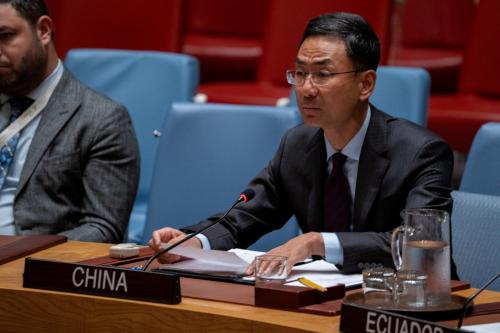China’s rise presents the United States with a series of difficult challenges, including disputes in the South China Sea. If and when it is peaceful, the U.S. should welcome it. Management of major global issues or areas of tension, such as nonproliferation, rivalry in the western Pacific, terrorism, the Iranian and North Korean nuclear program, frictions across the Taiwan Strait, climate change and energy security, will be immeasurably more difficult if U.S.-China relations become basically hostile. But if and when China’s rise takes a coercive turn, the U.S. needs to push back. In the coming years, China’s rise is likely to present many specific cases that require U.S. judgment on how to react. The maritime territorial disputes in the South China Sea currently highlight this challenge.
In a Brookings Foreign Policy Brief, Jeffrey Bader, Kenneth Lieberthal and Michael McDevitt discuss the significance of the South China Sea disputes and make recommendations for U.S. principles and practice. They argue that the U.S. must clearly define what are its interests in the area, namely protecting civilian and military freedom of navigation, preventing coercive resolution of disputes, preserving the international rules established by the U.N. Convention on the Law of the Sea (UNCLOS) determining claims to maritime rights and maintaining good relations with all of the six claimants to South China Sea land features. They also contend that the U.S. needs to understand what is not in its interest, namely taking a position on who has superior rights to any particular land feature, choosing sides rather than defending principles, treating the South China Sea as a venue for strategic rivalry with China or staking U.S. credibility on matters where the U.S. has no intention of, or interest in, acting decisively.
Pursuant to these interests, the authors propose a series of recommendations for the U.S. government, including:
• U.S. ratification of UNCLOS,
• Basing diplomacy on international law, including encouraging clarification by China and Taiwan of “nine-dash line” that is consistent with UNCLOS,
• Support for expeditious agreement on a Code of Conduct between ASEAN countries and China,
• Encourage all claimants to avoid new military construction in disputed land features,
• Partial relaxation of the U.S. arms embargo against Vietnam,
• Adopt a favorable attitude toward joint development of energy resources in disputed waters and encourage acceptance of traditional fishing rights for claimants until Exclusive Economic Zones enjoying international recognition can be negotiated, and
• Lowering the volume of U.S. government rhetoric over unilateral actions in the South China Sea that produce minor alterations in the status quo.
The Brookings Institution is committed to quality, independence, and impact.
We are supported by a diverse array of funders. In line with our values and policies, each Brookings publication represents the sole views of its author(s).



Commentary
China’s Rise Presents Challenges in the South China Sea
September 2, 2014